Description
0.4mm FeCrAl Resistance Wire
The Crazy Wire Company are best known and long established as Europe’s preferred suppliers of top quality FeCrAl resistance wire. We have enormous stock levels at all times as we use this wire to weave our mesh products.
0.4mm FeCrAl A1 wire is a type of heating wire made of an iron-chromium-aluminum alloy. The wire has a diameter of 0.4mm, which is commonly used in applications that require a moderate heating load. FeCrAl A1 wire is known for its high electrical resistance, high-temperature resistance, and good oxidation resistance, which make it suitable for use in heating elements, resistors, and other high-temperature applications. The wire is also easy to work with and can be easily shaped and bent into different configurations. FeCrAl A1 wire is commonly used in various heating applications, including electric ovens, toasters, water heaters, and industrial furnaces.
Technical Specification:
- Diameter – 0.4mm (400 Micron – 26 AWG)
- Ohms/ft – 11.46
- C = Min – 0% Max – 0.08%
- Si = Min – 0% Max – 0.7%
- Mn = Min – 0% Max – 0.4%
- Cr = Min – 20.5% Max – 23.5%
- Al = Nominal Comp – 5.8% – Min – 0% – Max – 0%
- Fe = Balance
Available KA1 Options:
- 1.15mm (17 AWG) – 1.35 ohms/m
- 1.02mm (18 AWG) – 1.77 ohms/m
- 0.9mm (19 AWG) – 2.15 ohms/m
- 0.8mm (20 AWG) – 2.84 ohms/m
- 0.7mm (21 AWG) – 3.58 ohms/m
- 0.6mm (22 AWG) – 4.94 ohms/m
- 0.65mm (22 AWG) – 4.26 ohms/m
- 0.64mm (22 AWG)
- 0.5mm (24 AWG) – 7.11 ohms/m
- 0.55mm x 0.1mm – 26.05 ohms/m
- 0.55mm (23 AWG) – 5.96 ohms/m
- 0.4mm (26 AWG) – 11.46 ohms/m
- 0.48mm (25 AWG) – 7.79 ohms/m
- 0.45mm (25 AWG) – 8.93 ohms/m
- 0.42mm (26 AWG) – 10.6 ohms/m
- 0.3mm (29 AWG) -19.89 ohms/m
- 0.38mm (27 AWG) – 12.79 ohms/m
- 0.37mm (27 AWG) – 13.26 ohms/m
- 0.35mm (27 AWG) – 14.69 ohms/m
- 0.34mm (28 AWG) -15.15 ohms/m
- 0.32mm (28 AWG) -17.46 ohms/m
- 0.2mm (32 AWG) – 46.11 ohms/m
- 0.28mm (30 AWG) – 22.75 ohms/m
- 0.27mm (30 AWG) – 24.86 ohms/m
- 0.25mm (30 AWG) – 29.29 ohms/m
- 0.23mm (31 AWG) – 34.36 ohms/m
- 0.21mm (32 AWG) – 40.44 ohms/m
- 0.1mm x 0.2mm – 71.83 ohms/m
- 0.1mm (38 AWG)
- 0.18mm (33 AWG) – 56.98 ohms/m
- 0.17mm (34 AWG) – 62.57 ohms/m
- 0.15mm (34 AWG) – 82.52 ohms/m
- 0.13mm (36 AWG) – 107.87 Ohms/m
- 0.12mm (36 AWG)
- 0.09mm (39 AWG) – 228.40 ohms/m
- 0.08mm (40 AWG)
- 0.07mm (41 AWG)
- 0.06mm (42 AWG) – 496 ohms/m
- 0.05mm (44 AWG) – 577 ohms/m
Why Use The Crazy Wire Company
- Quality of products: The Crazy Wire Company always offer high-quality products that meet industry standards and customer expectations.
- Selection: We offer a wide variety of wire products and sizes to meet the diverse needs of our customers. We have more than 600 products available through our site and counting.
- Price: We always offer the best value possible. Our wires are available as part of our major weaving processes, so it is bought at the best possible rate.
- Availability: Our products are kept in house and are ready to ship immediately.
- Customer service: Our experienced staff help our customers feel confident in their purchases and provide assistance when required.
What Else Is Available?
We do not only offer KA1 round wire. We also have a huge range of stainless steel wire and Ni80 round wire in immediate stock too.
Ribbon wire and flat wire are stocked for immediate dispatch too.
FAQs About This Wire
What Materials Are Used For A Coil Wire?
There are several materials that are commonly used for coil wires, including:
- Copper: Copper is a popular material for coil wires due to its high conductivity, low resistance, and relatively low cost.
- Aluminium: Aluminium is another popular material for coil wires, particularly in high-frequency applications, due to its high conductivity and low weight.
- Nickel: Nickel is used for coil wires in applications that require high resistance to corrosion, such as in high-temperature or high-pressure environments.
- Iron-chromium-Aluminium (FeCrAl): FeCrAl alloys, such as KA1, are used for coil wires in high-temperature applications due to their high resistance to oxidation and corrosion.
- Stainless steel: Stainless steel is used for coil wires in applications that require high mechanical strength and resistance to corrosion.
- Silver: Silver is used for coil wires in high-end audio and electrical applications due to its high conductivity and low resistance.
The choice of material for a coil wire depends on the specific requirements of the application, such as the operating temperature, frequency, and resistance, as well as cost and availability considerations.
How Do I Calculate The Amperage In A Heating Coil?
To calculate the amperage in a heating coil, you will need to know the power (in watts) and the voltage of the coil, as well as the resistance of the coil. You can use Ohm’s Law, which states that current (amperage) is equal to voltage divided by resistance:
I = V/R
where I is the current (amperage), V is the voltage, and R is the resistance.
To calculate the resistance of the heating coil, you can use the formula:
R = V^2/P
where R is the resistance, V is the voltage, and P is the power (in watts).
Once you have calculated the resistance, you can use Ohm’s Law to find the amperage:
I = V/R
For example, let’s say you have a heating coil with a power rating of 1000 watts and a voltage rating of 120 volts. Using the formula above, you can calculate the resistance of the coil:
R = V^2/P = 120^2/1000 = 14.4 ohms
Then, using Ohm’s Law, you can find the amperage:
I = V/R = 120/14.4 = 8.33 amps
So the amperage in the heating coil is 8.33 amps. Note that this calculation assumes that the heating coil is purely resistive, which is often not the case for more complex heating elements.
How Is Resistance Related To Thickness Of Wire?
The resistance of a wire is directly proportional to its length and inversely proportional to its cross-sectional area. This means that as the length of a wire increases, its resistance also increases. Conversely, as the cross-sectional area of a wire increases, its resistance decreases.
The thickness of a wire is related to its cross-sectional area, and so, in general, a thicker wire will have a lower resistance than a thinner wire of the same material and length. This is because a thicker wire has a larger cross-sectional area, which allows more electrons to flow through it, reducing the resistance.
However, it’s important to note that the relationship between the thickness of a wire and its resistance is not linear. For example, doubling the thickness of a wire may not result in a halving of its resistance, as the resistance of a wire also depends on the specific properties of the material and the presence of impurities.
What Is The Coil Material Used In Electric Water Heater?
The coil used in electric water heaters is typically made of nickel-chromium (NiCr) alloy, also known as Nichrome. This alloy is specifically designed to resist the high temperatures and corrosive conditions that can be present in water heaters.
Nichrome wire is commonly used for heating elements in a variety of applications, including electric water heaters, because it has a high melting point and excellent resistance to oxidation and corrosion. It is also ductile and can be easily formed into various shapes, making it a versatile material for heating elements.
The Crazy Wire Company is a leading UK based supplier of nichrome, FeCrAl, and stainless steel wires. We specialise in rapid delivery to any location around the country. Our factory is located in Warrington, which is the historic home of the UK’s wire industry.
Check out our blog ‘everything that you need to know about wires’ for more information on resistance wire in general. Our goal for our blogs and help guides is to answer as many questions as possible to help to explain the possibilities of mesh to our customers.
We also offer similar products through our highly popular eBay store, check us out there too.
Contact our team today if you have any questions at all. We are always really keen to help in any way that we can.

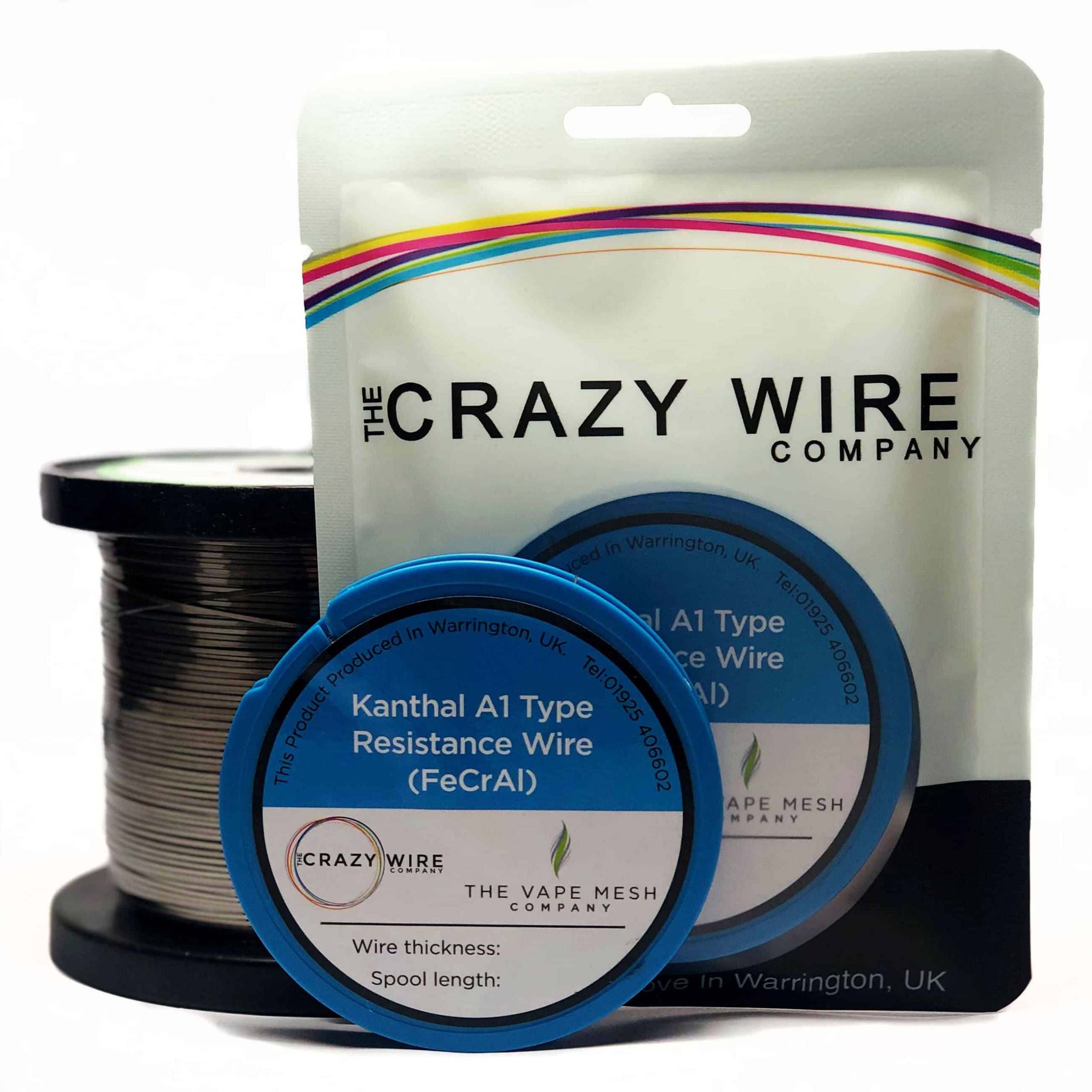


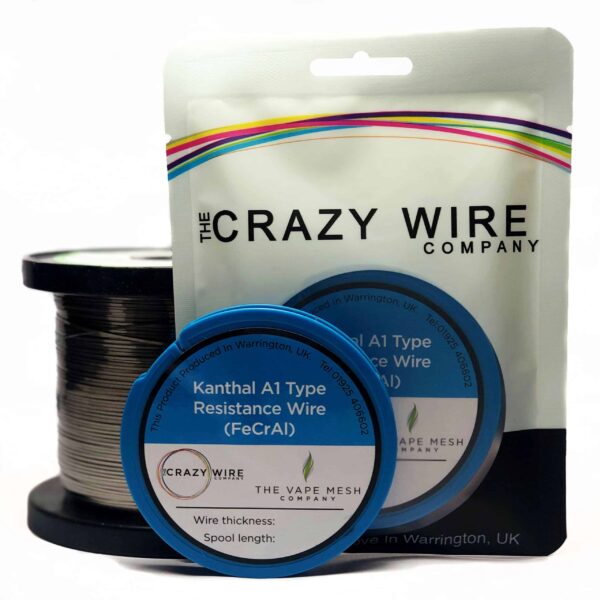
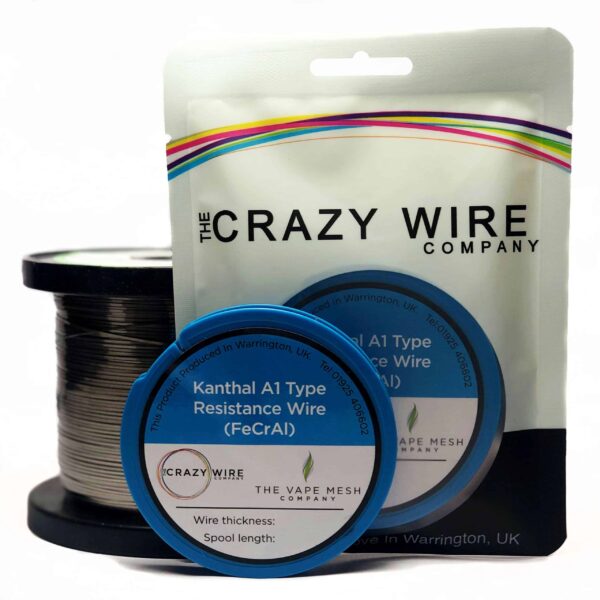
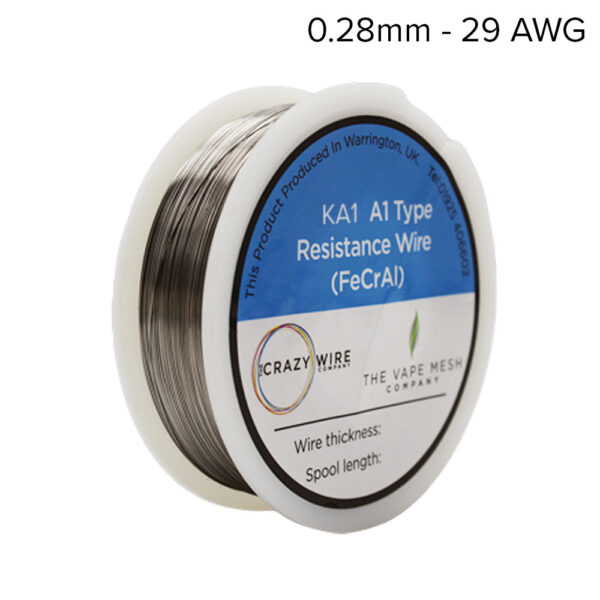
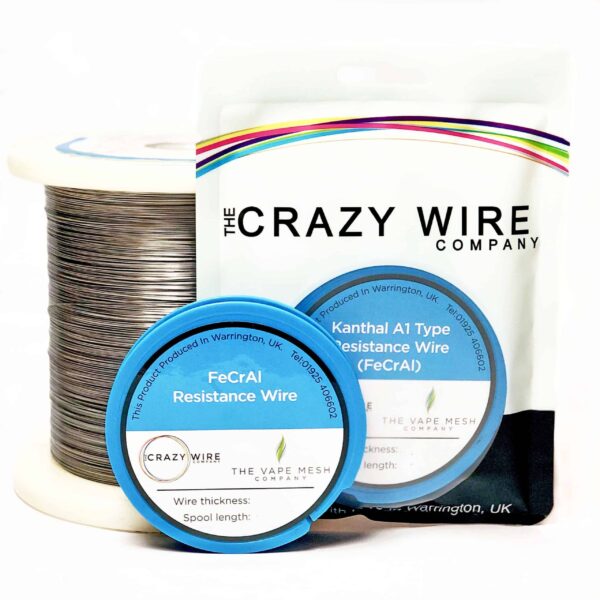





Reviews
There are no reviews yet.